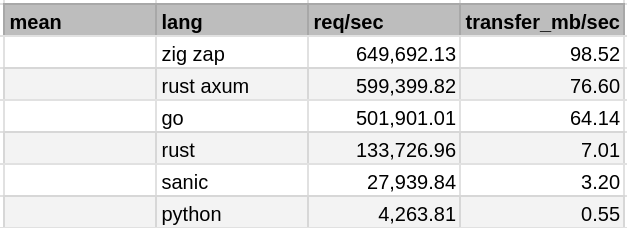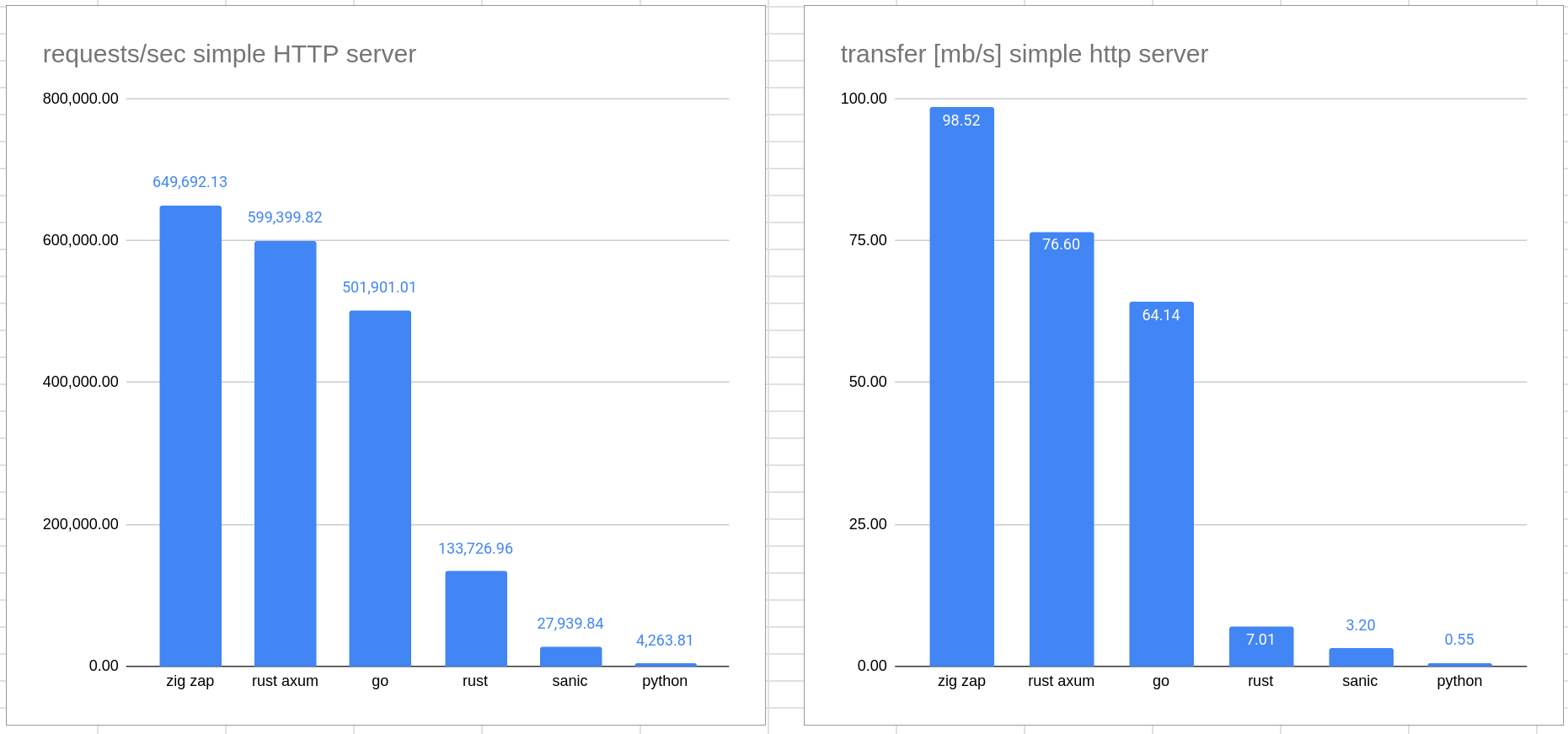Zap is intended to become the zig replacement for the kind of REST APIs I used to write in python with Flask and mongodb, etc. It can be considered to be a microframework for web applications.
What I need for that is a blazingly fast, robust HTTP server that I can use with zig. While facil.io supports TLS, I don't care about HTTPS support. In production, I use nginx as a reverse proxy anyway.
Zap wraps and patches facil.io - the C web application framework.
⚡ZAP⚡ IS SUPER ALPHA
Under the hood, everything is super robust and fast. My zig wrappers are fresh, juicy, and alpha.
Here's what works:
- Super easy build process: zap's
build.zignow uses the up-and-coming zig package manager for its C-dependencies, no git submodules anymore.- tested on Linux and macOS (arm, M1)
- hello: welcomes you with some static HTML
- routes: a super easy example dispatching on the HTTP path
- serve: the traditional static web server with optional dynamic request handling
- sendfile: simple example of how to send a file, honoring compression headers, etc.
- hello_json: serves you json dependent on HTTP path
- endpoint: a simple JSON REST API example featuring a
/usersendpoint for PUTting/DELETE-ing/GET-ting/POST-ing and listing users, together with a static HTML and JavaScript frontend to play with. - mustache: a simple example using mustache templating.
- endpoint authentication: a simple authenticated endpoint. Read more about authentication here.
- http parameters: a simple example sending itself query parameters of all supported types.
- cookies: a simple example sending itself a cookie and responding with a session cookie.
- websockets: a simple websockets chat for the browser.
- Username/Password Session Authentication: A convenience authenticator that redirects un-authenticated requests to a login page and sends cookies containing session tokens based on username/password pairs received via POST request.
- MIDDLEWARE support: chain together request handlers in middleware style. Provide custom context structs, totally type-safe, using ZIG-CEPTION. If you come from GO this might appeal to you.
- MIDDLEWARE with endpoint
support:
Same as the example above, but this time we use an endpoint at the end of the
chain, by wrapping it via
zap.Middleware.EndpointHandler. Mixing endpoints in your middleware chain allows for usage of Zap's authenticated endpoints and your custom endpoints. Since Endpoints use a simpler API, you have to user.setUserContext()andr.getUserContext()with the request if you want to access the middleware context from a wrapped endpoint. Since this mechanism uses an*anyopaquepointer underneath (to not break the Endpoint API), it is less type-safe thanzap.Middleware's use of contexts. - Per Request Contexts : With the introduction of
setUserContext()andgetUserContext(), you can, of course use those two in projects that don't usezap.SimpleEndpointorzap.Middleware, too, if you really, really, absolutely don't find another way to solve your context problem. We recommend using azap.SimpleEndpointinside of a struct that can provide all the context you need instead. You get access to your struct in the callbacks via the@fieldParentPtr()trick that is used extensively in Zap's examples, like the endpoint example. - Error Trace Responses: You can now
call
r.sendError(err, status_code)when you catch an error and a stack trace will be returned to the client / browser.
I'll continue wrapping more of facil.io's functionality and adding stuff to zap to a point where I can use it as the JSON REST API backend for real research projects, serving thousands of concurrent clients.
Claiming to be blazingly fast is the new black. At least, zap doesn't slow you down and if your server performs poorly, it's probably not exactly zap's fault. Zap relies on the facil.io framework and so it can't really claim any performance fame for itself. In this initial implementation of zap, I didn't care about optimizations at all.
But, how fast is it? Being blazingly fast is relative. When compared with a simple GO HTTP server, a simple zig zap HTTP server performed really good on my machine:
- zig zap was nearly 30% faster than GO
- zig zap had over 50% more throughput than GO
Elephant in the room: I was intrigued comparing to a basic rust HTTP server. Unfortunately, knowing nothing at all about rust, I couldn't find one and hence tried to go for the one in The Rust Programming Language. Wanting it to be of a somewhat fair comparison, I opted for the multi-threaded example. It didn't work out-of-the-box, but I got it to work and changed it to not read files but outputting a static text just like in the other examples. Maybe someone with rust experience can have a look at my wrk/rust/hello code and tell me why it's surprisingly slow, as I expected it to be faster than the basic GO example. I'll enable the GitHub discussions for this matter. My suspicion is bad performance of the mutexes.
Update: Thanks to @felipetrz, I got to test against more realistic Python
and Rust examples. Both python sanic and rust axum were easy enough to
integrate.
So, being somewhere in the ballpark of basic GO performance, zig zap seems to be ... of reasonable performance 😎.
See more details in blazingly-fast.md.
$ git clone https://github.com/zigzap/zap.git
$ cd zap
$ zig build run-hello
$ # open http://localhost:3000 in your browser... and open http://localhost:3000 in your browser.
If you don't have an existing zig project, create one like this:
$ mkdir zaptest && cd zaptest
$ zig init-exe
$ git init ## (optional)Note 1: Zap is developed with zig master. This version of zig has the
package management features in place that are used in the following
instructions. Nix users are lucky; you can use the existing flake.nix and run
nix develop to get a development shell providing zig, and also all
dependencies to build the and run the GO, python, and rust examples for the
wrk performance tests. For mere building, nix develop .#build will only
fetch zig master.
With an existing zig project, adding zap to it is easy:
- Add zap to your
build.zig.zon - Add zap to your
build.zig
To add zap to build.zig.zon:
.{
.name = "My example project",
.version = "0.0.1",
.dependencies = .{
// zap v0.1.6-pre
.zap = .{
.url = "https://github.com/zigzap/zap/archive/refs/tags/v0.1.6-pre.tar.gz",
.hash = "1220a3eab193523b30721dae56a763468b7348b3d1f0b3364d68f6d548c753a72c5a",
}
}
}Then, in your build.zig's build function, add the following before
`b.installArtifact(exe)``:
const zap = b.dependency("zap", .{
.target = target,
.optimize = optimize,
});
exe.addModule("zap", zap.module("zap"));
exe.linkLibrary(zap.artifact("facil.io"));From then on, you can use the zap package in your project. Check out the examples to see how to use zap.
You can change the URL to zap in your build.zig.zon
- easiest: use a tagged release
- or to one of the tagged versions, e.g.
0.0.9 - or to the latest commit of
zap
Go to the release page. Every release
will state its version number and also provide instructions for changing
build.zig.zon and build.zig.
Go to to the tags page to view all
available tagged versions of zap. From there, right click on the tar.gz link
to copy the URL to put into your build.zig.zon.
After changing the .url field, you will get an error like this at the next
attempt to zig build:
.../build.zig.zon:8:21: error: hash mismatch:
expected: 12205fd0b60720fb2a40d82118ee75c15cb5589bb9faf901c8a39a93551dd6253049,
found: 1220f4ea8be4a85716ae1362d34c077dca10f10d1baf9196fc890e658c56f78b7424
.hash = "12205fd0b60720fb2a40d82118ee75c15cb5589bb9faf901c8a39a93551dd6253049",
^~~~~~~~~~~~~~~~~~~~~~~~~~~~~~~~~~~~~~~~~~~~~~~~~~~~~~~~~~~~~~~~~~~~~~
Note: If you don't get this error, clean your global zig cache: rm -fr ~/.cache/zig. This shouldn't happen with current zig master anymore.
With the new URL, the old hash in the build.zig.zon is no longer valid. You
need to take the hash value displayed after found: in the error message as
the .hash value in build.zig.zon.
Use the same workflow as above for tags, excpept for the URL, use this schema:
.url = "https://github.com/zigzap/zap/archive/[COMMIT-HASH].tar.gz",Replace [COMMIT-HASH] with the full commit hash as provided, e.g. by git log.
At the current time, I can only add to zap what I need for my personal and professional projects. While this happens blazingly fast, some if not all nice-to-have additions will have to wait. You are very welcome to help make the world a blazingly fast place by providing patches or pull requests, add documentation or examples, or interesting issues and bug reports - you'll know what to do when you receive your calling 👼.
Check out CONTRIBUTING.md for more details.
See also introducing.md for more on the state and progress of this project.
We now have our own ZAP discord server!!!
You can also reach me on the zig showtime discord server under the handle renerocksai (renerocksai#1894).
Being blazingly fast requires a constant feed of caffeine. I usually manage to provide that to myself for myself. However, to support keeping the juices flowing and putting a smile on my face and that warm and cozy feeling into my heart, you can always buy me a coffee ☕. All donations are welcomed 🙏 blazingly fast! That being said, just saying "hi" also works wonders with the smiles, warmth, and coziness 😊.
You build and run the examples via:
$ zig build [EXAMPLE]
$ ./zig-out/bin/[EXAMPLE]... where [EXAMPLE] is one of hello, routes, or serve.
Example: building and running the hello example:
$ zig build hello
$ ./zig-out/bin/helloTo just run an example, like routes, without generating an executable, run:
$ zig build run-[EXAMPLE]Example: building and running the routes example:
$ zig build run-routesconst std = @import("std");
const zap = @import("zap");
fn on_request(r: zap.SimpleRequest) void {
if (r.path) |the_path| {
std.debug.print("PATH: {s}\n", .{the_path});
}
if (r.query) |the_query| {
std.debug.print("QUERY: {s}\n", .{the_query});
}
r.sendBody("<html><body><h1>Hello from ZAP!!!</h1></body></html>") catch return;
}
pub fn main() !void {
var listener = zap.SimpleHttpListener.init(.{
.port = 3000,
.on_request = on_request,
.log = true,
});
try listener.listen();
std.debug.print("Listening on 0.0.0.0:3000\n", .{});
// start worker threads
zap.start(.{
.threads = 2,
.workers = 2,
});
}

